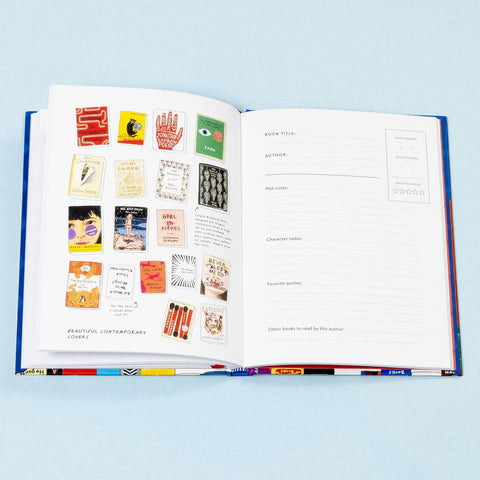Have you ever wished you could remember every detail of a captivating novel, every poignant line of poetry, or every mind-bending philosophical argument you encountered in a thoughtful essay? Have you ever felt the frustration of forgetting a book’s title, a character’s name, or even the exact emotions a story evoked within you? A bibliophile reading journal is the perfect antidote to these literary woes, allowing you to capture the essence of your reading experience and revisit it whenever you choose.

Image: www.pinterest.com
More than just a log of titles read, a bibliophile reading journal serves as a gateway to understanding your personal reading journey. It’s a space for introspection, where you can trace the evolution of your tastes, explore themes that resonate with you, and discover patterns in your choices. With each entry, you create a unique record of your evolving relationship with literature, making it not just a tool for memory but a chronicle of your literary soul.
Crafting Your Literary Haven: The Basics of a Bibliophile Reading Journal
There’s no strict formula for a bibliophile reading journal – the beauty lies in its personal nature. However, incorporating some basic elements can help you reap its full potential:
1. Essential Information: The Book’s Details
For a comprehensive record, include:
- Title: This might seem obvious, but it’s essential for future reference.
- Author: Note the author’s full name and, if applicable, any pseudonyms or writing partnerships.
- Genre: Classifying genres helps track your literary interests and identify patterns in your reading choices.
- Publication Date: This provides context for the book’s creation and potential historical influences.
- Format: Whether you prefer a physical copy, e-book, or audiobook, this detail adds to the overall record.
2. Your Personal Impressions: Beyond the Plot
The heart of a bibliophile reading journal lies in your personal responses. Here’s where your unique connection with the book comes to life:
- Synopsis: Summarize the plot in your own words, focusing on what resonated most with you.
- Characters: Explore your thoughts on the main characters, their motivations, and their significance to the story.
- Themes: Identify the central themes, their exploration within the book, and their impact on your understanding.
- Setting: Consider how the setting contributes to the story’s atmosphere, mood, and overall impact.
- Writing Style: Analyze the author’s writing style – their language, tone, pacing, and use of literary devices.
- Overall Impression: Articulate your overall thoughts and feelings about the book, conveying your emotional response.

Image: www.chroniclebooks.com
3. Creative Exploration: Beyond the Page
Your journal can become a canvas for a richer literary experience:
- Quotes: Highlight passages that resonate with you, offering context and explaining why they stand out.
- Art: Sketch characters, scenes, or symbols from the book to encapsulate its visual essence.
- Poetry: Write a poem inspired by the book, embodying its themes, characters, or emotions.
- Music: List songs that evoke the book’s mood or represent characters’ journeys.
- Connections: Explore connections between this book and others you’ve read, or to personal experiences or world events.
The Evolution of a Literary Journey: Beyond the Journal Page
The true magic of a bibliophile reading journal comes not just from its content, but from the reflections it inspires. As you revisit past entries, you’ll:
- Trace Your Literary Growth: Observe how your reading tastes and analytical approach have shifted over time.
- Identify Emerging Themes: Discover recurring themes or interests that might hint at deeper philosophical or personal concerns.
- Rekindle Memories: Relive the joy, sorrow, or intellectual stimulation a book provided, reigniting your connection to it.
- Uncover Hidden Connections: Unravel unexpected connections between seemingly unrelated books, enriching your understanding of literature.
- Fuel New Discoveries: Use your journal to create reading lists based on emerging interests or books you’ve enjoyed in the past.
The Digital Age: Navigating Online Reading Journals
While pen and paper offer a tangible and intimate connection with your thoughts, the digital age has opened up new possibilities for capturing your reading experiences:
- Dedicated Apps: Several apps offer intuitive interfaces and features like book tracking, reading challenges, and community features.
- Online Platforms: Websites and online journals allow you to organize your thoughts and share your insights with fellow readers.
- Digital Notebooks: Digital notebooks with customizable templates and formatting options offer flexibility and convenience.
However, whether you prefer the classic paper journal or the convenience of digital options, remember that the essence of a bibliophile reading journal lies in its personal touch. It’s a space for introspection, a tool for self-discovery, and an ever-evolving testament to your love for literature.
Bibliophile Reading Journal
Conclusion: Embarking on Your Literary Voyage
A bibliophile reading journal is more than just a tool for recording books read – it’s a passport to a deeper understanding of yourself, your reading habits, and your relationship with literature. From tracing the threads of your evolving tastes to uncovering the echoes of your personal journey within the pages of stories, this intimate chronicle empowers you to become a more conscious and engaged reader. So, grab your journal, choose your next adventure, and set sail on a voyage through the boundless realms of literature.






